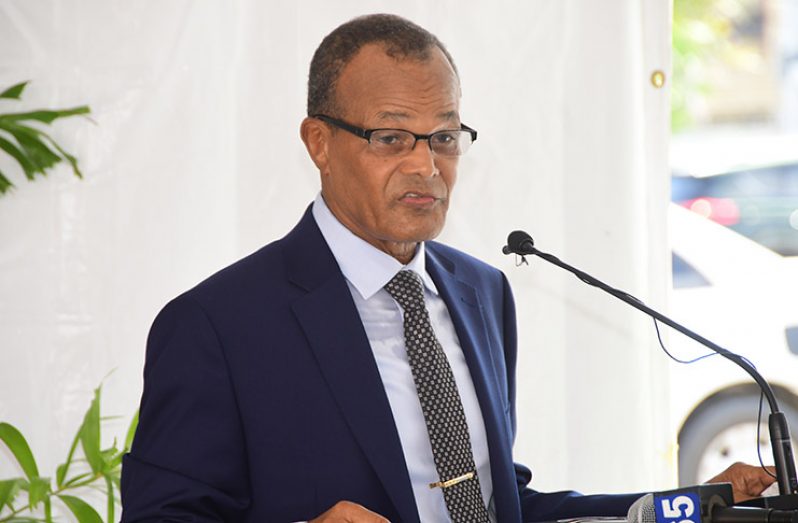…Gov’t launches drug treatment court
…to rehabilitate, reintegrate drug abusers
GOVERNMENT, on Monday, opened its first Drug Treatment Court at the Georgetown Magistrates’ Court, with the aim of rehabilitating drug users and reintegrating them into society.
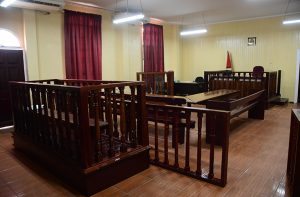
This pilot programme was made possible with the aid of the Supreme Court of Judicature of Guyana, in collaboration with the Organization of American States Inter-American Drug Abuse Control Commission (OAS-CICAD), and the National Anti-Narcotics Agency.
During the launch on Monday, Attorney General and Minister of Legal Affairs, Basil Williams, SC, explained that the offenders and society will benefit greatly from this pilot programme.
The AG stressed that the programme gives offenders a choice beyond traditional court proceedings to help them get the treatment needed to overcome their addiction and be productive people in society. Additionally, the minister disclosed that the pilot programme will help within areas such as prison overcrowding and reducing recidivism, while helping to curb drug addiction in Guyana.
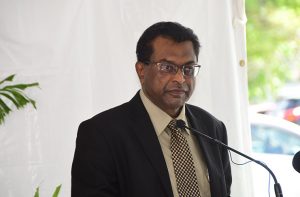
He explained that his chambers, on behalf of the Government, has drafted an amendment to the Narcotic Drugs and Psychotropic Substances (Control) Act, Chapter 10:10. “The purpose of this bill is to reduce prison overcrowding by removing the custodial sentence for a small amount of cannabis,” the minister said.
The Attorney General explained that the draft bill has amended section four of the act, by making provision for possession of cannabis, of the quantity which does not exceed 30 grams, to be an offence that carries a monetary fine and not custodial sentencing like before.
Also, the act has made it possible for the trafficking of cannabis to move up from 15 grams to over 30 grams.
Additionally, Minister of Public Security, Khemraj Ramjattan said that the drug treatment court will use judicial proceedings to coordinate magistrates, prosecutors, defence counsel to work with counselors and social workers to form a treatment team for the offender.
“It is indeed a diversionary measure which will provide rehabilitative services to offenders rather than to see them in a setting which will graduate them into higher crime,” Minister Ramjattan said.
Ramjattan stressed that the goal of the drug treatment court was to encourage persons charged with drug possession to undergo treatment.
Ramjattan also stressed the nexus between drug dependency and criminal offences since drug users who do not have the money to purchase the narcotics will turn to crime just to aid their habits.
Director of the National Anti-Narcotics Agency, Major General, Retired, Michael Atherly said that there was a need for the vigorous implementation of the national drug strategy plan. The plan, Atherly said, aims at guiding and monitoring the actions of government departments and their stakeholders to reduce the demand for and the supply of drug thus resulting in their abuse.
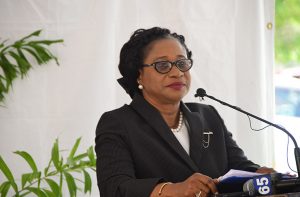
Meanwhile, Chancellor of the Judiciary (ag), Justice Yonette Cummings-Edwards, said that the refurbishment of the court cost $1M and magistrates were trained for drug treatment. She also gave an overview of how the drug treatment court works.
The Chancellor explained that a person who meets the eligibility requirements must have pleaded guilty to or been found guilty of the related charge(s).
The offenders’ sentences would be deferred while they participated in the Drug Treatment Court programme.
Participants who complete the programme may receive a light sentence such as a fine or community service, or have their underlying criminal charge dismissed or have no conviction recorded.
Offenders are given an opportunity to voluntarily enter the court programme and undergo a four-phase treatment plan, supervised by treatment providers and a magistrate.
Participants are rewarded for maintaining their treatment plans and sanctioned for failure to meet their obligations.
Upon successful completion of the programme there is a graduation ceremony by which time the participant will be rehabilitated and prepared for reintegration into their community where they can meaningfully contribute to society.
However, if the participant fails to complete the programme that person will be processed as normal in the traditional criminal justice system.
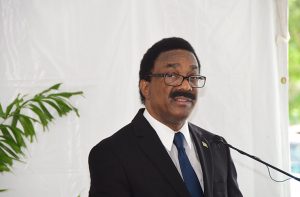
According to the Chancellor, the programme requires a lot of commitment from participants and dedicated case supervision from the drug treatment court team.
It may require participation for many months to help the person maintain long-term recovery strategies.
Offenders are treated with random drug tests to ensure that they stay clean. Participants must attend court frequently so they can be monitored and encouraged to make and maintain their recovery.
The pilot programme was designed to give structure to participants’ lives and to support their recovery. Unlike traditional court, Drug Treatment Courts take a collaborative approach to justice.
The Magistrate, State Prosecutor, Defence Attorney, Probation Officer, Police Officer, Treatment Provider, and Mental Health specialists work together with each participant to seek solutions for his or her benefit.






